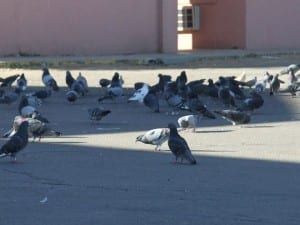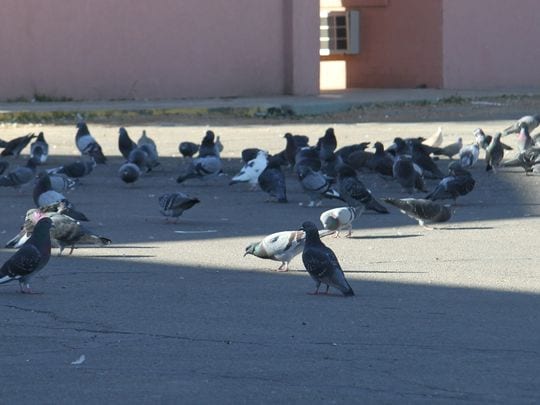Being a peregrine fanatic I’m kind of fond of pigeons – at least from the prey point of view – so when I was in downtown Pittsburgh on Sunday I stopped by Mellon Square to check out the scene.

Even for a peregrine falcon the number of pigeons at Mellon Square is way too much of a good thing. I counted more than 150 and I couldn’t see all of them. The pigeons outnumbered people more than 30 to 1.
This explains why peregrines hang out on the Oliver Building window sills. It’s like visiting an all-you-can-eat restaurant. The food may not be that great but there’s so much of it!
This kind of pigeon over-population repulses most people and they want a quick fix, the quickest being poison. But if you poison a pigeon, you’ll poison a peregrine. After a culling episode pigeons reproduce fast to fill the void – in fact lethal control actually increases the flock – but the peregrines take years to recover. And peregrines are endangered in Pennsylvania. It’s bad, bad, bad to poison an endangered species.
So what to do?
Pigeons need two things to reach the numbers found at Mellon Square: lots of food and places to nest. They reproduce in direct proportion to their food supply. If food is scarce some won’t nest at all. If food is plentiful they lay the next clutch of eggs before the first set has hatched, producing more than 12 chicks per year.
The food problem is obvious. Sidewalks at Mellon Square are coated with bird seed. Control the food source (the people who feed them) and you’ve got most of the problem licked. To make a really dramatic difference, control the nest sites as well.
City pigeons nest on buildings and bridges. They also nest in buildings. Find the buildings involved and spend the time and money to block the access holes. Last summer the University of Pittsburgh cleaned the Cathedral of Learning and blocked off the pigeon nest holes as part of the cleaning job. One year later there are far fewer pigeons at Schenley Plaza.
And finally, there’s a foolproof solution that makes both the pigeon-feeders and the pigeon-haters happy. Many European cities have solved their pigeon problem permanently by building dovecotes and pigeon lofts. Yes, they built nest sites. They control the population at the dovecotes by substituting dummy eggs and they control the food level by giving pigeon lovers an approved place to feed and interact with the birds.
This keeps the pigeons and the birdseed off the street. An elegant solution.
Pigeon Patrol Products & Services is the leading manufacturer and distributor or bird deterrent (control) products in Canada. Pigeon Patrol products have solved pest bird problems in industrial, commercial, and residential settings since 2000, by using safe and humane bird
deterrents with only bird and animal friendly solutions. At Pigeon Patrol, we manufacture and offer a variety of bird deterrents, ranging from Ultra-flex Bird Spikes with UV protection, Bird Netting, 4-S Bird Gel and the best Ultrasonic and audible sound devices on the market today.
Voted Best Canadian wholesaler for Bird Deterrent products ten years in a row.
Contact us at 1 877-4-NO-BIRD,(604) 585-9279 or visit our website at www.pigeonpatrol.ca
Pigeon/Pigeon Patrol / Pigeons Roosing / Vancouver Pigeon Control / Bird Spikes / Bird Control / Bird Deterrent / PIgeon Deterrent / Surrey Pigeon Control / Pest / Seagull deterrent / Vancouver Pigeon Blog / Birds Inside Home / Pigeons in the cities / Ice Pigeons / What to do about pigeons / sparrows, Damage by Sparrows, How to Keep Raccoons Away, Why Are Raccoons Considered Pests / De-fence / Pigeon Nesting / Bird Droppings / Pigeon Dropping / woodpecker control / Professional Bird Control Company / Keep The Birds Away / Birds/rats/seagull/pigeon/woodpecker/dove/sparrow/pidgeon control/pidgeon problem/pidgeon control/flying rats/pigeon problems/ bird netting/bird gel/bird spray/bird nails/bird guard

